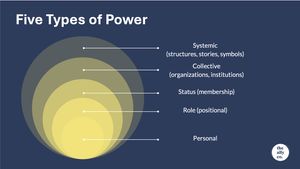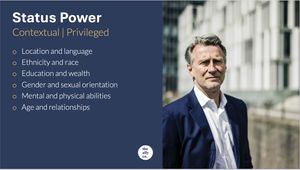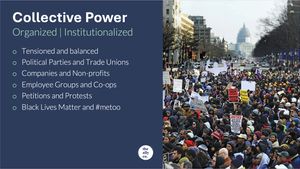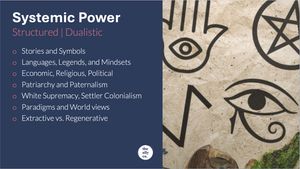
If we think about power only in terms of authority or dominance, we miss the nuance (and responsibility) that comes with holding it. Power, is in all our relationships, our communities, our institutions - and in our quiet sense of self.
The Right Use of Power™ framework, developed by Dr. Cedar Barstow, offers a compassionate and grounded way to understand power. It teaches us not just how to recognize it, but how to use it ethically, in ways that strengthen relationships and foster trust.
Below are the five types of power in this framework, and how they can show up in everyday life.
1. Personal Power
Your inner capacity to act, speak, choose, and create. It lives in your self-worth, resilience, creativity, and sense of agency. Everyone has personal power, even when fear or self-doubt clouds it.
Personal power grows when we’re supported, encouraged, and given opportunities to thrive. And it’s the foundation for using any other type of power wisely.
Example: A new employee speaks up in a meeting for the first time, sharing an idea they’ve been holding onto. That’s personal power - it comes from within, not from a title.
Personal power grows when we’re supported, encouraged, and given opportunities to thrive. It’s the foundation for using any other type of power wisely.
Core Elements of Personal Power
- It’s portable, meaning you take your personal power wherever you go.
- It’s often called “personality” or “character traits” - your charisma and communication skills, your knowledge and experience, your humour, emotional or social intelligence, and/or your motivation and drive.
- It fluctuates, often moment to moment and day to day. If you’ve ever had one of those days where you didn’t feel like doing anything, or felt that you were powerless in the face of the world, you’ve felt this fluctuation.
- It grows over time. As we gain experience and convert that into knowledge and skills, our ability to take on bigger and harder challenges continues to grow.
- Popular synonyms for personal power include concepts like “grit” and “resiliency”, and/or the ability to face hardships while continuing to grow and thrive.

2. Role Power
The authority that comes with a specific role or responsibility. It’s often temporary and tied to position, not personality (think teachers, managers, parents, and team captains).
Role power keeps things functioning, but it works best when grounded in humility and accountability.
Example: A leadership consultant decides when the group takes breaks, how conflict is handled, and what’s taught. Their responsibility is to use their power with care and consistency.
Core Elements of Role Power
- It’s contextual and doesn’t exist outside of that. For example, a plumber only has “plumber power” when they’re engaged in repairing pipes for their customer. If they ran into each other in the grocery store, that power relationship would not exist.
- It’s relational. For example, a teacher needs a student, a doctor needs a patient, and a salesperson needs a customer.
- It’s typically appointed, hired, or “granted” by an organization or, at the very least, negotiated between two parties.
- It's usually formal, obvious, and comes with a uniform, a title and a job description.

3. Status Power
The influence or privilege someone holds based on social or cultural perception - often unspoken, and sometimes unearned. It can come from age, race, gender, education, wealth, attractiveness, popularity, or seniority.
Recognizing status power helps us check bias, name privilege, and share the mic.
Example: Two people present the same (or similar) idea in a session. One is extroverted, well-liked, and experienced; the other is introverted and new. Whose idea gets traction first? That’s status power at play.
Elements and Examples of Status Power
-
Can be understood as “membership” in a group that holds power, typically a majority or people with “privilege”. A discussion about ‘intersectionality’ is fundamentally a discussion about power - particularly status power.
-
Below are a few different types of status power, including our perspective (in parentheses) as to what might be considered the “up power” status in each type listed below (and this certainly isn’t an exhaustive list).
- Gender (cis-gendered, male)
- Age (midlife, 30-50)
- Ethnicity (caucasian)
- Education (advanced)
- First language (english)
- Sexual orientation (heterosexual)
- Ability (able-bodied)
- Health (not impaired)
- Marital status (married)

4. Collective Power
The strength that comes from joining with others toward a shared purpose. Movements, communities, and teams all hold collective power.
Collective power is a reminder: we don’t have to create change alone. Aligned action builds momentum.
Example: A group of parents lobbies for safer crosswalks near a school. Alone, their voices might be ignored , but together they get the city’s attention.
Examples of Status Power
- The civil rights movement of the 1950s and 60s in America
- Black Lives Matter
- Wikipedia (the free encyclopedia that anyone can edit)
- Labour unions
- Street gangs (not every organization or institution is positive)
- Any group (company or otherwise) with a shared vision, mission and values

We're building collective power over at The Co., so check us out if you're picking up what we're putting down.
5. Systemic Power
The influence embedded in systems, structures, and norms (think policies, laws, institutions, cultural defaults). It’s not held by one person, but it shapes who gets access, protection, and voice.
Systemic power is the hardest to see and the hardest to shift. But naming it is the first step toward equity and justice.
Example: A hiring process that favours certain schools, names, or hobbies/interests over others - even unintentionally - is systemic power at work.

Why does all of this matter?
Understanding these five types of power helps us become more ethical, self-aware leaders - whether we’re guiding a team, raising a child, organizing a campaign, or simply moving through the world.
Power isn’t bad. But it’s always relational. When we recognize the kind of power we hold (and the kind others hold), we can choose to use it with intention.
Questions to Ask Yourself:
- Where do I hold power?
- Where do I not hold power?
- How can I use my power in ways that uplift, protect, or empower others?
This is the heart of the Right Use of Power™: bringing skill, compassion, and awareness to the influence we carry.
Want to talk more about this?
Pathway #1: Follow us online on LinkedIn or YouTube
Pathway #2: Check out The Co. to see if it's for you
Pathway #3: Contact us or reach out to Jeff directly.
We’d love to learn about your journey (and to contribute if we can).
